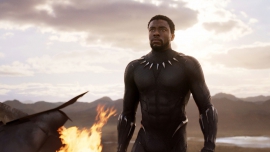"If I think about the future of cinema as art, I shiver" (Y. Ozu, 1959)
Black Panther (Ryan Coogler)
Saturday, 05 May 2018 08:56(Or why I didn’t get
Black Panther the first time around…)
Giona A. Nazzaro
Well, who doesn’t like the mighty T’Challa, the wise monarch of Wakanda, and the first African-American superhero in the Marvel Pantheon? You do not need to be a comic-book nerd to have heard about him. His iconic image has spread across all the realms of pop culture and cultural studies alike. Suffice to say that T’Challa is a real superhero, because he’s made of and completely relates to the African-American experience; its contradictions, the still unsolved social rights issues, and its painful historical complexities and atrocities. For some (those who usually do not think that Black Lives Matter…), Black Panther might even be a tad too close to home for comfort. Therefore, also this side of the pond there were many, many expectations about Coogler’s take on Black Panther. Since with his previous work Creed he managed to restore Rocky’s working-class roots, and thus partially return the boxer’s story to the African-American community (Apollo is Rocky’s spiritual father and mentor, something that those who were eager to write off Stallone forgot too easily and too quickly…), there was genuine curiosity about how he would tackle T’Challa’s bourgeois and political contradictions. A monarch, a rebel, a scientist, a millionaire, a reformist who boasts revolutionary credentials (this is why, later on, Marvel needed Luke Cage, hero for hire…). Obviously, there also was a monumental promotional job involved before the release of Black Panther. Not a day went by before the film hit the theatres without some major trade featuring an article about Coogler’s upcoming movie. And yes, there were also the messianic tones rising from the African-American community hailing it weeks before its release as a political, cultural, economic gamechanger. Therefore, when the film was finally on the big screen, a certain degree of disappointment was felt this side of the pond, at least by yours truly, an unabashed fan of the MCU (yes: guilty as charged). Some of us over here did not dare to admit it openly - you do not want to be in the same league with Trump and his ludicrous circus of freaks - but it felt as if the much-heralded celebration of the African-American experience had been transformed in a Disneyland theme park (and after all, Disney owns the MCU…). (The French magazine “Positif” brushed it off exactly in those terms a bit later). Somehow, we felt let down, to the point that even the set pieces felt lacklustre (they are not, of course, not worse than Ant-Man, anyway…). By the way, let’s not forget that, when the Saudis decided to finally lift their ban on cinema, they decided that Black Panther should be the forerunner in their domestic theatres. So, what went wrong with some experiences of the first (obviously European, white, left-wing, etc….) viewing of Black Panther? Simply put, everyone (and their mother…) has their own take on what the African-American experience should be (especially the white guys, especially if European, those that would have voted for Obama the third time…). And this goes a long way in explaining how even the best intentions (especially those…) can go wrong. Ok: you went in the theatre thinking, due to your white privilege, of Amiri Baraka, Max Roach’s We Insist! and Melvin Van Peebles. But what you got was an incredibly tight, sleek P. Daddy tune as if rewritten by Kendrick for Rihanna. Of course, you are caught off guard (wait: are they re-assessing also the legacy of the “other” Panthers as well…?). But it’s only your (our…) fault. Entrepreneurs such a Jay Z. should have taught us that, in a Marxian way, you need to become the master of your own means of productions. Once you do that, you can also effectively control your own image. Black Panther does exactly that. Because form is content. It offers a hypertextual image of the African-American experience that can be easily shared (sampled…) and therefore transmitted as a mythopoeic lemma. That’s exactly why Black Panther is really a ground-breaking and game-changing film. It finally breaks down the cultural barriers between the so called high- and low-brow definitions of African-American experience and culture and manages to create a new standing ground that is larger and complex. Its boundaries extend from the fandom of comic-books to action figures and from hip-hop to pan-African consciousness. The scope of what Black Panther attempts and succeeds to do is so broad that it could fill a Kamasi Washington suite. And there would still be some room left to fill. It basically says that Alice Coltrane and T’Challa belong in the same world because both are expressions of the African diaspora. And that our picture of what “Africa(n)” is needs a complete rethinking. Time’s up. The African-American experience needs to be finally considered as a whole again and not as isolated segments to be used only for academic dissertations. And if this means that Black Panther becomes one of the most gigantic blockbusters in the recent history of Hollywood’s box office smash hits, so be it. There’s still a lot to be done, but this simple and extraordinary fact might finally be a step in the right direction (and maybe it will finally dawn on us too, on the other side of the pond). After all, as Idris Ackamoor would claim, aren’t we all Africans?
Ultimi articoli pubblicati
- 2025-03-24 Chime/Cloud/Serpent’s Path (Kurosawa Kiyoshi)
- 2025-03-24 Abiding Nowhere (Tsai Ming-liang)
- 2025-03-24 The Box Man (Gakuryū Ishii)
- 2025-03-24 Grand Tour (Miguel Gomes)


